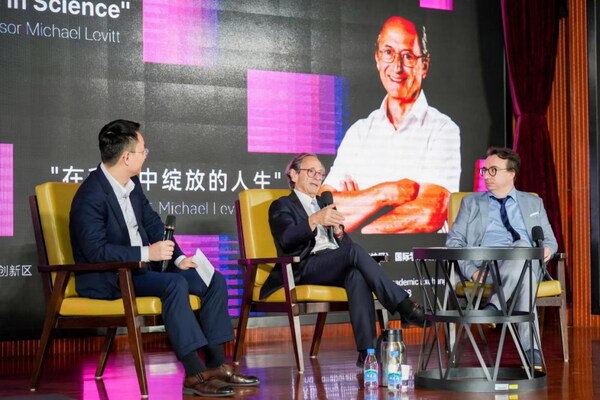SUZHOU, China, Oct. 10, 2024 /PRNewswire/ -- On 8 October, Xi'an Jiaotong-Liverpool University (XJTLU) welcomed Nobel laureate Professor Michael Levitt for an engaging science talk. He delivered the talk, A Wonderful Life in Science, both onsite and to a worldwide online audience.
XJTLU Master Forum | “A Wonderful Life in Science” by Professor Michael Levitt
Professor Levitt, a computational biologist, is the Robert W. and Vivian K. Cahill Professor of Cancer Research at Stanford University. His pioneering work in developing computer algorithms to model and analyse biological molecules has substantially impacted biology, with important implications for human health. In 2013, he was awarded the Nobel Prize in Chemistry for his work, along with two other co-winners.
"I want young people to appreciate the glorious nature of science both basic and applied," Professor Levitt said, ahead of his talk. "They should see that research is done by normal people often mentored and inspired by others."
Professor Levitt is a member of the National Academy of Sciences in the USA, the American Academy of Arts and Sciences, and the Royal Society of London. He was one of the first scientists to develop computer simulations that help researchers understand and predict the motion of atoms and molecules in complex biological systems. His research led to a new understanding of protein structures and their characteristics.
During his talk, Professor Levitt reflected on significant milestones in modern biology, including the discovery of DNA's structure and advances in protein folding, which laid the foundation for computational structural biology. He emphasised the importance of integrating physics, chemistry, and biology to uncover the secrets of life.
Professor Levitt has witnessed the dramatic changes AI can bring to computational biology. These include Google DeepMind's AI system, AlphaFold, which can reliably predict a protein's 3D structure from its amino acids without time-consuming and costly experiments.
A significant portion of Levitt's talk focused on the transformative impact of artificial intelligence. He explained how he utilises ChatGPT as a smart assistant to understand new concepts, write code, and even provide advice. He said, "The future of everything is AI."
In closing, he also gave some valuable advice to the students. He said: "Be creative, be persistent, be passionate, and be kind and good."
You can watch the full video of the talk here.
source: Xi'an Jiaotong-Liverpool University
【你點睇?】當局料聖誕新年期間逾1300萬人次出入境,較去年同期大增。你對本港聖誕新年市道是否有信心?會否出境旅遊?► 立即投票
































